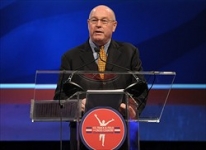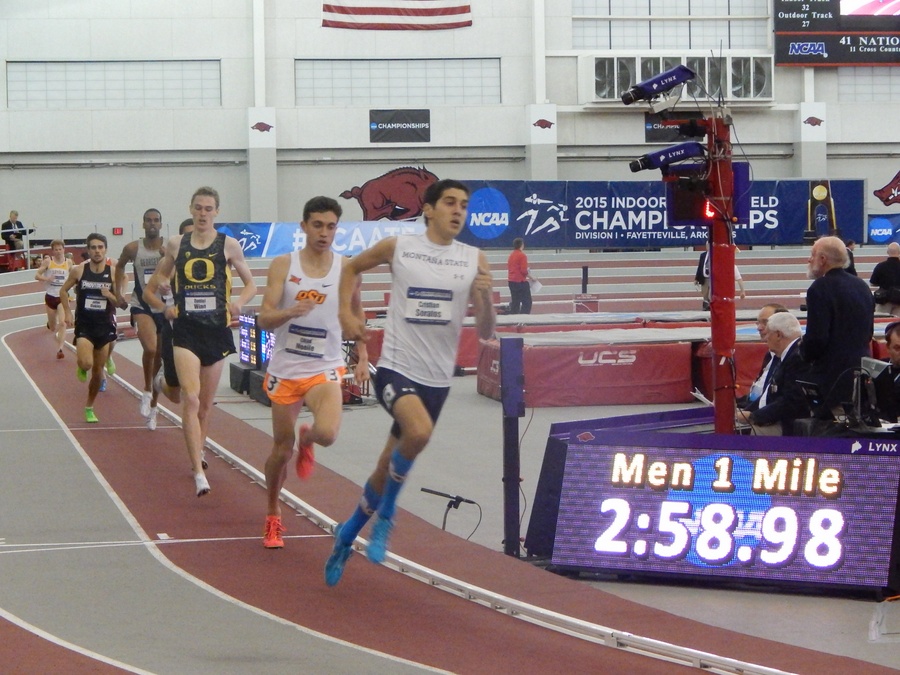Moving the Dial on the Mile: Exclusive Interview with USTFCCCA CEO Sam Seemes

But there was nothing more talked about in Fayetteville during those two days of the national championships than the fact that nine people ran under 4 minutes in the semifinal...
By Duncan Larkin, Mile wire
If there’s one person in the collegiate world who can most help in restoring the Mile to prominence it’s U.S. Track & Field and Cross Country Coaches Association CEO Sam Seemes. The former LSU Assistant Coach leads that organization, which represents the interests of NCAA track & field and cross country coaches. Bring Back the Mile caught up with Seemes earlier this month on the heels of the IAAF accepting Mile times as a 1500 meter qualifier for the upcoming World Championships in Beijing.
Bring Back the Mile: What do you personally think about the Mile as a distance?
Sam Seemes: It’s a historical distance. It’s probably right alongside the 100—whether it be 100 yards or 100 meters. This is probably the iconic event in track & field if you go back in time. Obviously it went to the wayside in the 1980s a little when there was a lot of alteration to track events, both indoors and outdoors, but especially outdoors. And when I say alteration of track events, I mean here in the U.S.
The IAAF is now accepting the Mile as a qualifying distance for Worlds in Beijing. What do you think about that decision?
I think that’s a good thing. I never thought the IAAF was quote “opposed” to that. They didn’t have a standard for it. But I feel if the U.S. had pushed that to happen in previous years—whether it be with the Mile or some metric measurements—then I think the IAAF would have been open to that, because I don’t think the IAAF has any wish or plan to try and eliminate the U.S. from international competition. In fact I think they welcome the U.S.’s participation and I think they would do whatever was best for track & field in the U.S. and accommodate for that on the international scale. But we’ve certainly never made an approach that way in the Mile or other events. I think this is a good step. You see more Miles being run internationally all the time. The great 4 minute Mile was not broken in the United States; it was broken internationally.
Do you see the Mile internationally coming back to prominence?
Yes. I think it’s already come back to a certain degree. Are people only going to run the Mile? I don’t think that’s necessarily so. I think it has regained prominence. You look at some international competitions and the main event held at them is the Mile. They are choosing the Mile for some particular reason. I can’t say exactly what it is, because I haven’t spoken with all the different meet promoters and organizers. But some of the more-prestigious meetings internationally during the summer each year are choosing to do that.
With the decision for the IAAF to accept the Mile in mind, is the USTFCCCA moving to lobby the NCAA to add the Mile outdoors?
Not presently. We had a proposal at our convention four years ago that came up to do that. It was defeated by the coaches. One of the reasons that was brought up during the debate was because you couldn’t qualify for international events at the time. The fact that the IAAF has opened up doesn’t mean I know if a proposal will be brought back in the future or not, but presently, today, there’s not.
What would it take to get that going again and make that change to the Mile now that things are different?
Well from our internal standpoint, any member of a Division can submit a proposal through the proper channels within their Executive Committee for consideration. From an NCAA standpoint, any member institution during the rules-consideration period can propose a rules change to the NCAA. We would like to think that the opinion of the coaches would have some weight and that we are a proper venue to take that through. If someone has interest in that there are a couple of avenues that they can pursue.
Would you personally like to see the Mile run at the NCAA outdoors? I know there are rules and procedures, but how does Sam feel about that?
Personally, I think it has a lot of merit simply because we need to do everything that we possibly can do in track & field and cross country to relate to a broad spectrum of the general public. We have to bridge that gap. The general public is not going to bridge that gap. Anything we can do to make it spectator friendly or reader understandable, then that’s a step in the right direction. For instance—and I could be wrong about this, because I’m not a big runner—but I know people who run in the U.S. They keep logs. Although there may be somebody, I’ve never heard of somebody who didn’t keep their log listing how many miles that they are running. I know nobody over here who keeps a lot of how many meters. I think with the Mile you relate to a broader spectrum. I think the sporting goods manufacturers have estimated that there are 50 million runners in the U.S. You would think that group would have interest in track and cross country, but it’s pretty apparent that currently they have little interest in track & field and cross country. I think one of the gaps we are missing with tying that particular group in is that I’m not sure they relate to what we do as to what they do. In that spectrum, I think it’s got some legitimacy do it.
Hearing that you are behind this, is there anything that you can do in your position to move the Mile movement forward? Or are your hands tied?
I serve at the direction of our membership. Constantly I am accused or it’s noted that I have an agenda. Usually that is based on who people see me talking to. If I talk with one person for one minute and then go over and talk with someone else for 5 minutes, whoever I was standing with the longest is what my agenda is. I’ve learned just to be honest with people and tell them that I do have an agenda. And that is first of all I am for anything that will make collegiate track & field and cross country better as a sport speaking in the whole. I said collegiate, because that’s basically who we serve. Colleges have the biggest investment in the sport in this country if not in the entire world. If we are ever going to have to change the sport, that’s where it’s going to have to come from. It’s important that collegiate track & field and cross country be successful. Any that’s good for that, my agenda is that I’m for it. Anything that’s bad for it, I’m against it.
Obviously, to be better, we have to change. I do promote change. Sometimes it’s not necessarily specific, but general, because our members need to come up with the ideas and try to flush them out. I do try to promote change, because successful to a certain extend that our sport is today in one, participation numbers, and in two, the diversity of participation that it offers. What we are doing is not working. Unless we change, we are not going to be successful. If the Mile helps us be successful, then I’m all for it. If it’s going to make us worse then I’m against it. [He laughs.] Now it sounds like I’m talking out of both sides of our mouth. I’m really not, because I’m saying that things that the broader group of people can relate to is going to aid us in being a better sport.
There is a grass roots movement trying to get the Mile back to prominence, so it sounds like that movement would also contribute to moving the dial. But I know there is some resistance still.
You will notice that I split out track and cross country. Collegiately this mainly affects us here in the U.S. It’s great to intermix in the international world, but our business collegiately is in the United States. That’s our base—good, bad, or indifferent that’s our base. We have to do things first that gives us a strong base and gives us support from that base here in the United States. In my opinion, that’s who we should be serving and reaching out to. I believe the international community will accept that—whatever it is—if it’s different than what they do on a daily basis if it makes track and field and cross country stronger here in the United States. They will build a bridge to let us mix with them when those opportunities are available. They’re not going to exclude us. There is no reason for them to want to exclude us.
Back in 2011, coach Pat Henry from Texas A&M tried to get the Mile in the NCAA Championships and it went up for a vote, but was turned down. Do you feel like things are shifting in a new direction now? Do you feel that if the vote happened today the results would be different?
I really don’t know. I’m not sure if the trend has changed. I’m not sure in people’s minds if it’s changed or it hasn’t. I’m a believer that we need to look at track & field and cross country as sports and not totally individual endeavors. In my estimation, we don’t do a very good job at trying to emulate or implement what is best for the sport overall as much as we try to implement what is best for a few individuals. I think that this weakens the sport, and also, while I’m all for individuals chasing high goals, most people in the U.S. and most collegiates—a really high percent as much as 90 percent—are never going to compete internationally at all.
Going back again: we need to be doing what is best for the sport here in the U.S., because if the sport is strong here then there will be more opportunities for individuals to take part in them. It will also strengthen the sport internationally. As much as a lot of people will want to say the sport is strong internationally, and that could be true that it’s stronger than it is in the U.S., it’s not as strong internationally as it used to be. Meets in Europe, meets internationally that used to be strong, are struggling. The sport is not as strong as it was. Sure there are still some great high-profile meets that are really successful, there are few of them in the U.S., but you can’t survive on one success 
So this comes full circle then. What resonates with runners here is their mileage. They don’t call it meterage. They call it mileage.
I think that’s true. I can tell you that at the NCAA Division I indoor meet that was in Fayetteville, Arkansas in March, there were some incredible performances. There were some collegiate records on the men’s and women’s side. There were some top-two or three all-time bests collegiately or American. But there was nothing more talked about in Fayetteville during those two days of the national championships than the fact that nine people ran under 4 minutes in the semifinal at a collegiate championship to make the final of the Mile. So I think there is some substance to that alone. There wasn’t anyone in that building who didn’t understand what just went after those two semifinals.
